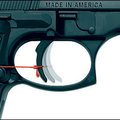The PC industry is proving to be surprisingly lively
 | |
WHEN the personal computer (PC) turned 25 last year, many anniversary articles read like obituaries. There was general agreement that the PC had become a commodity product, its makers mere box-shifters, and that growth prospects were mediocre. Further consolidation was all the industry had to look forward to. The announcement on August 27th that Acer, a Taiwanese PC-maker, would pay $710m to buy Gateway, a smaller American rival, seems to fit that picture.
The combined firm will be the world's third-largest PC-maker by unit shipments. Acer will have the size and global presence to compete with the two American heavyweights, Hewlett-Packard (HP) and Dell, as well as Lenovo, a Chinese firm which will drop to fourth place if the deal goes ahead (see chart). But the takeover also shows that there is still life in the PC business—and will be for years to come.
Worldwide PC shipments have lately been growing by about 12% a year—better than expected, though still a far cry from the late 1990s, when the industry sometimes grew at more than twice that rate. Yet this figure does not do justice to the market's current dynamism.
This year the number of PCs sold will reach an all-time high of nearly 260m. Much of the growth is being generated by consumers and small businesses. Both increasingly prefer laptop PCs to desktops; in some countries, such as Japan, the former already outsell the latter. In America, the world's biggest PC market, this will happen by the end of the year, according to IDC, a market-research firm. Above all, emerging economies such as China and India are making manufacturers happy: their rising middle classes and small businesses have discovered the PC. In China, shipments are growing nearly four times as fast as in America.
Only two years ago most industry observers would not have dared to predict that HP would be best placed to benefit from these growth opportunities. But today its well-designed machines, distinctive marketing and vast network of retail partners appear to be just what the doctor ordered. Consumers are quite willing to order desktop machines online, but they prefer to touch laptops before buying them, since they are much more of a fashion statement than a beige box under the desk, says Charles Smulders of Gartner, a market-research firm. HP is also present worldwide, notably in China, where it is the number two behind Lenovo.
No less surprisingly, Acer is similarly well placed, having staged one of the more stunning turnarounds in the PC industry after an ill-fated attempt to enter the American market in the 1990s. Like HP, it sells through retail and has put an emphasis on design and marketing. Buying Gateway will boost Acer's presence in America. In Europe, meanwhile, it plans to acquire Packard Bell, a PC-maker based in the Netherlands. Lenovo has been in talks to buy Packard Bell, but Gateway says it intends to exercise an option, obtained last year, to purchase the firm.
In contrast, the market has been moving away from Dell, once the industry leader. Its hyper-efficient supply chain and online-only sales model were perfect when corporate customers were driving growth. But competitors have cut costs and online-only is not enough when selling to consumers and in emerging economies. Having lost the top spot to HP, Dell has started to give itself a makeover: selling through Wal-Mart, a retail giant, for example, and adding colour to some products.
Lenovo, for its part, faces difficulties too. Since it acquired IBM's PC division in 2004, its main customers have been corporations. The firm is by far the leader in China and will continue to dominate this market, thanks to its retail relationships and the fact that it does not outsource manufacturing. Yet Lenovo has been struggling to expand elsewhere.
Fortunes could always be reversed, of course. Consumers could lose their appetites for laptops and businesses might start to upgrade their ageing PCs to make use of Windows Vista, the new Microsoft operating system that so far has not managed to give the industry much of a boost. But this would not change the overall direction of the PC market. In its second 25 years, it will increasingly resemble the car industry. Cars may well be a commodity, but they come in all shapes and sizes, for every lifestyle and need. In future, PCs will also be more about taste and tailored products and much less about technology.




